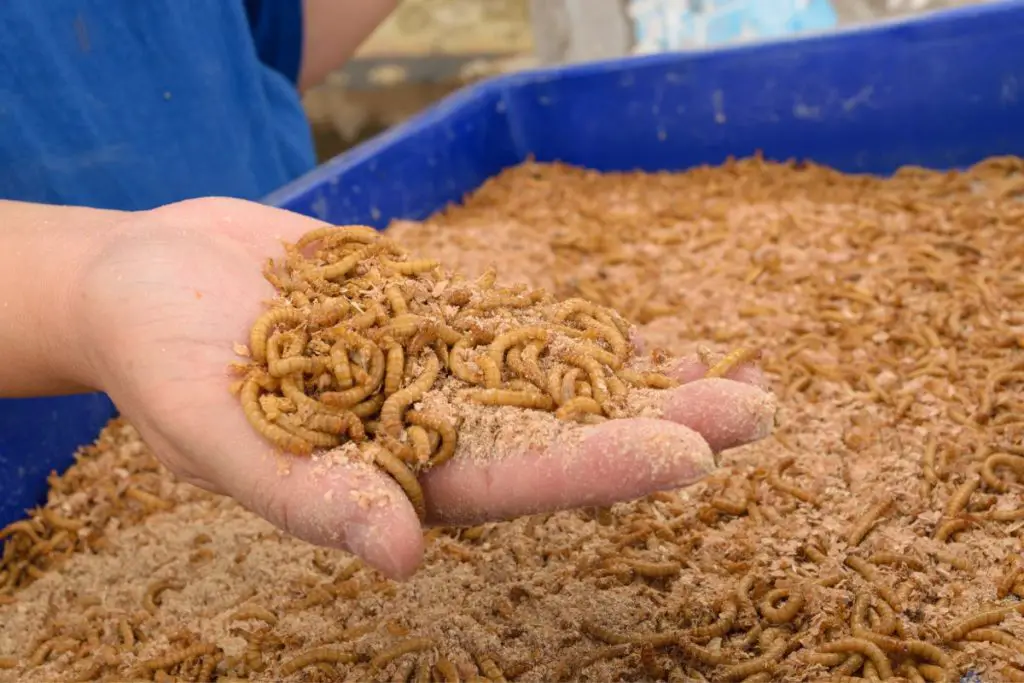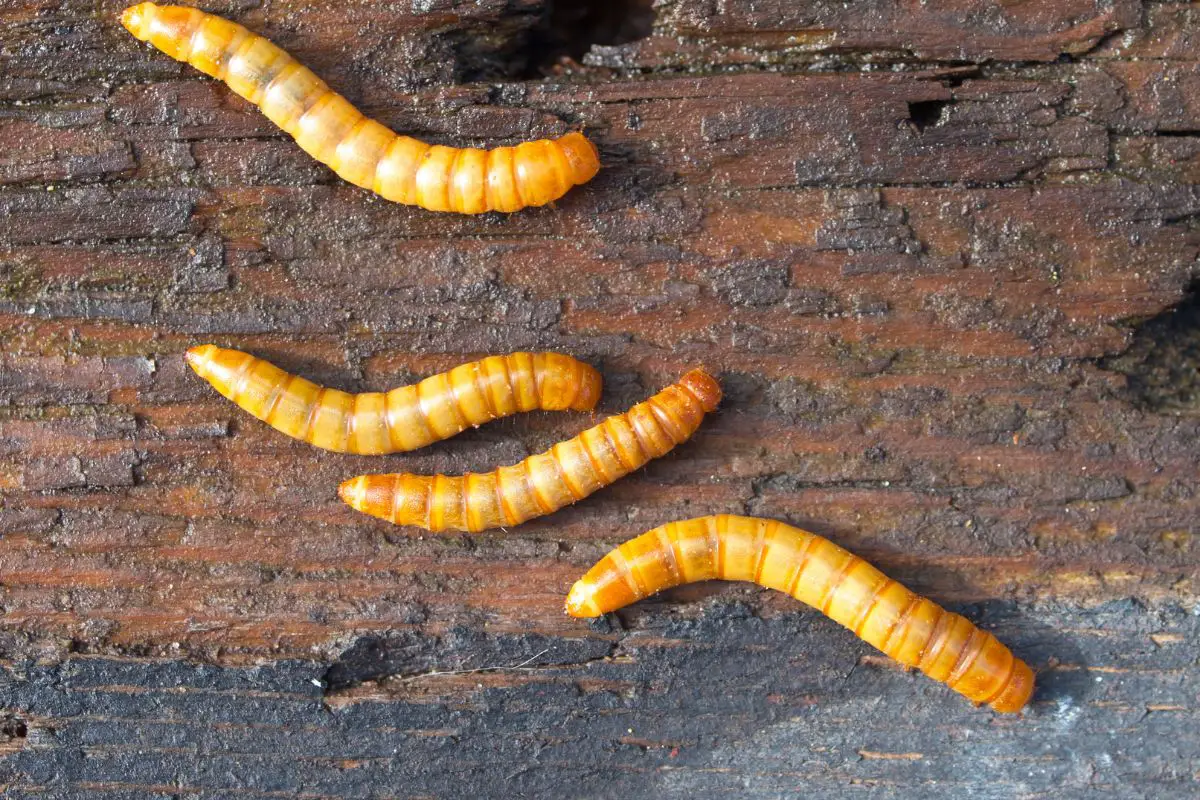Chickens can eat mealworms and they are a nutrient-rich addition to your flock’s diet. As protein powerhouses, mealworms increase their egg production, help them during molting, and improve their overall health. They can also be dehydrated or freeze-dried to be ready for the winter months.
To us humans, mealworms seem unappetizing. For chickens, however, these crunchy larvae of the darkling beetle are bites of goodness. Chickens go crazy over them and for good reason!
But are mealworms both safe for chickens and good for chickens?
Table of Contents
What Are Mealworms?
Mealworms are the larvae of the yellow mealworm (Tenebrio molitor), a species of the Darkling Beetle.

Mealworms are insects and not worms. They have an exoskeleton but are juvenile in their life cycle.
The four stages of the mealworm life cycle are egg, mealworm, pupa, and Darkling Beetle. Darkling beetles lay eggs that hatch into mealworms, which grow into pupae. A pupa then grows into a Darkling Beetle.
You should consider making a DIY mealworm farm to produce feed for your chickens or wild birds.
Are Mealworms Safe For Chickens?
Yes! Mealworms are a perfectly safe food source for both young and adult chickens to eat.
Dried mealworms are safe to feed your chickens in moderation as a treat. They should not constitute the entire feed for your chickens. While they have no toxins, they do have high protein and fat content.
Non-GMO dried mealworms are rich in nutrients and may overwhelm your backyard chickens, leading to health issues such as obesity, fatty liver and heart disorders. Excess protein is bad for chickens as it may cause blistered feet, loose bowels, and respiratory issues.
Mealworms contain an incredible amount of protein. For old chickens, a few mealworms are enough to provide them with the amount of protein they need. So store-bought mealworms can last you much longer than you can imagine.
Mealworms are also safe baby chicks, but it’s a good idea to wait until they reach at least 3 weeks old. Otherwise, depending on the breed and growth rate, their digestive system might be unable to digest the fat and protein content.
Benefits of Mealworms
1. Boosts chickens’ protein intake
Protein is an important part of a chicken’s diet. Chickens need protein to grow smooth feathers to keep them warm in cold weather.
Dried mealworms are a natural source of protein as every dried mealworm is almost 50 percent protein.
2. Makes a tasty treat
Let’s face it, we all love being pampered and spoiled from time to time. Our chickens are no different. They deserve some yummy treats for enriching our lives and laying those adorable eggs.
However, you should feed your laying hens treats in moderation as they are likely to gain weight and become obese. Obese hens produce fewer eggs and can experience problems while laying.
2. Helps chickens get through molting
Chickens molt every year to replace their old, ragged feathers with new, glossy ones. It requires extra protein to produce new feathers. Daily mealworms will help your chickens look fabulous again within a short period.
Ahickens’ immune system will also be affected during the molting season, so you need to boost their diet with mealworms to make this stressful process easier for them.
3. Increases egg production and quality
Chickens require sufficient amounts of protein and calcium to produce more and better quality eggs. Mealworms are rich sources of protein, essential vitamins and minerals.
Feeding mealworms to your laying hens also increases the taste and nutritional value of their eggs.
4. Helps with training chickens
You can train your chickens to perform a variety of tricks by rewarding them with mealworms as treats. You can get your chickens to do various tricks, run obstacles, and even avoid antisocial behaviors by using mealworms as treats.
It is also an easy way to get hesitant chickens into their coop, as they’d rather eat mealworms than stay outside.
5. Boosts their immune system
Protein is an excellent immune booster, and all creatures need it in adequate amounts. Chickens are no different.
Additionally, mealworms are rich in methionine, an essential amino acid that is effective at controlling cannibalism in chickens. A methionine-deficient diet also results in poor chicken feed conversion, decreased egg production in layer hens, and growth retardation in meat chickens.
FAQs
Can baby chicks eat mealworms?
Baby chicks and younger chickens can eat mealworms provided they are not too large and they do not contain any harmful chemicals. Consider slicing the worms into small pieces to ensure the young chickens can eat them safely and easily.
However, avoid feeding mealworms to baby chicks under three weeks old. Protein is ideal for growing chickens, but the high calorie and fat content in mealworms can disrupt their body system.
Baby chicks less than 3 weeks old may also be unable to digest the fat and protein content.
Therefore, use mealworms only as treats for both baby chicks and adult chickens.
How many mealworms should I feed my chickens?
Adult chickens should not eat more than 10 live or 4 dried mealworms in a given day. Mealworms should never make more than 10 percent of their regular diet.
However, laying hens and molting chickens can safely eat more mealworms to help them stay healthy, strong, and happy. Laying hens will enjoy eating mealworms, as it benefits their health and egg production. Molting chickens also need extra protein to grow their feathers again.
Can I feed my Chickens Freeze-dried mealworms?
Yes, you can! Chickens can safely eat free-dried mealworms provided they are from a reputable source. Like live mealworms, free-dried mealworms are dense sources of protein, fat, vitamins, and minerals.
Fried-dried mealworms are a high-protein treat for poultry. They also come with a long shelf life so you can feed them to your chickens throughout the year.
If you don’t want to grow your own mealworms, then freeze-dried mealworms are the way to go.

